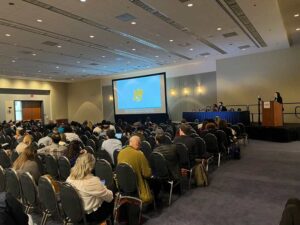
Shangqing (Joyce) Jiang, 5th-year PhD student at the CHOICE Institute, presented her work with Drs. David Veenstra and Greg Guzauskas as a podium presentation at the American Society of Human Genetics (ASHG) annual conference in Nov 2023. This research project focuses on uncertainty in predicted risk in economic evaluations of polygenic risk scores (PRSs).
In recent years, PRSs have shown promising predictive power in identifying individuals at high-risk for disease to guide personalized screening and treatment. However, the accuracy and precision of PRS are limited by issues inherent in observational genome-wide association studies, which results in uncertainty in estimated disease risk. Understanding how uncertainty in estimated disease risk influences projected clinical and economic outcomes is needed before clinical adoption and reimbursement of PRS. Yet it is unclear whether and how published economic evaluations to date have incorporated these considerations.
To answer this question, Joyce Jiang, advised by Dr. Veenstra, led a project of a targeted review for PRS decision modeling studies. Among 16 included articles, only 2 articles explicitly examined uncertainty in PRS-predicted risk in sensitivity analyses and found that uncertainty in PRS-predicted risk was one of the most influential factors impacting the value of PRS. This project identified significant knowledge gaps in the economic evaluations of PRS: to date, published economic evaluations have not consistently incorporated the uncertainty in PRS-predicted risk or examined how this uncertainty impacts the value of PRS. This study calls for future studies to explicitly incorporate these considerations to facilitate evidence-based policy making for PRS.

Additional information:
- Research group: RIPS (Rational Integration of Polygenic Risk Scores) research group across University of Washington, Vanderbilt University, and Geisinger Health Systems.
- Funding agency: NHGRI. R01HG012262. Rational Integration of Polygenic Risk Scores.